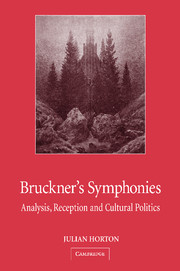Book contents
- Frontmatter
- Dedication
- Contents
- Preface
- 1 Introduction: the critical problem
- 2 Bruckner and late nineteenth-century Vienna: analysis and historical context
- 3 Right-wing cultural politics and the Nazi appropriation of Bruckner
- 4 Bruckner and musical analysis
- 5 Bruckner and the construction of musical influence
- 6 Analysis and the problem of the editions
- 7 Psychobiography and analysis
- 8 Epilogue: Bruckner and his contexts
- Bibliography
- Index
5 - Bruckner and the construction of musical influence
Published online by Cambridge University Press: 22 September 2009
- Frontmatter
- Dedication
- Contents
- Preface
- 1 Introduction: the critical problem
- 2 Bruckner and late nineteenth-century Vienna: analysis and historical context
- 3 Right-wing cultural politics and the Nazi appropriation of Bruckner
- 4 Bruckner and musical analysis
- 5 Bruckner and the construction of musical influence
- 6 Analysis and the problem of the editions
- 7 Psychobiography and analysis
- 8 Epilogue: Bruckner and his contexts
- Bibliography
- Index
Summary
The question of which influences acted upon the development of Bruckner's symphonic style has been frequently addressed and yet sparsely analysed. At every stage of the works' reception history, commentators have hastened to locate the symphonies within various lines of development, generally without extended analytical qualification, and often in the service of interpretative, music-historical or even political agendas. At the same time, musicologists concerned with questions of musical influence have been slow to recognise the rich territory offered by the symphonies for the elucidation of theoretical problems in this area. Diverse attempts to bring literary critical models of influence to bear on musical repertoires have largely ignored Bruckner, despite exploration of their relevance for the nineteenth-century symphony in general. A study that brings these two fields of enquiry together could be beneficial to an understanding both of Bruckner and of the notion of musical influence in general.
In the early reception of the symphonies the perception of Wagnerian affiliations was pervasive. Viennese critics of hostile and apologetic persuasions cited more or less superficial Wagnerisms as grounds for classifying Bruckner's music as a symphonic after-effect of the ‘artwork of the future’. Conflicting contemporary responses to the Seventh Symphony make this abundantly clear. Hans Merian's review of the first performance of the work in Leipzig noted the Wagnerian association with displeasure: ‘The work is shot through with numerous reminiscences of Wagner's compositions, an almost unavoidable feature of Wagnerian imitations.’
- Type
- Chapter
- Information
- Bruckner's SymphoniesAnalysis, Reception and Cultural Politics, pp. 162 - 195Publisher: Cambridge University PressPrint publication year: 2004



